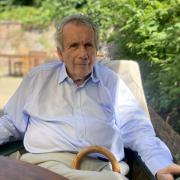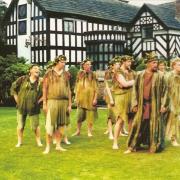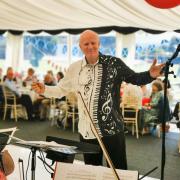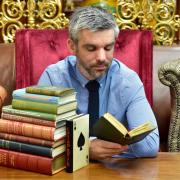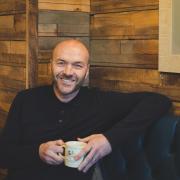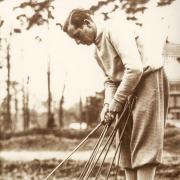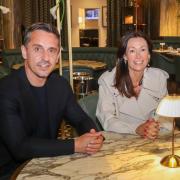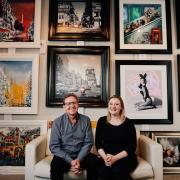Alan Turing was a brilliant mathematician and computer scientist, famous for breaking the Enigma code when he worked at Bletchley Park from 1939 until the end of the Second World War.
After the war he lived in Wilmslow, and in 1948 joined Manchester University's Department of Mathematics, in computer development and artificial intelligence. Today, his former home in Adlington Road is marked by an English Heritage blue plaque. It's where, on 7th June 1954, his cleaner discovered his body, poisoned by cyanide. A half-eaten apple was found nearby, thought to be laced with cyanide, although the apple was never actually tested. The coroner at the inquest into Turing's death, which came just weeks before what would have been his 42nd birthday, recorded a verdict of suicide, 'while the balance of his mind was disturbed'.
In 2012, Professor Jack Copeland, director of the Turing Archive for the History of Computing, revealed he thought it was more likely that Turing had accidentally inhaled cyanide fumes while conducting an experiment. Those who relate to his suffering believe suicide is more likely.
Whatever the cause, it is undisputed that Turing was treated appallingly towards the end of his life, by a society that regarded gay people as criminals and condemned those who were prosecuted to chemical castration or imprisonment.

Early life
When he was nine years old, Turing's headmistress at St Michael's Primary School, Hastings, said: 'I have had clever boys and hard-working boys, but Alan is a genius'.
He excelled in chess and his maths teacher, Mr Randolph from Sherborne School in Dorset, also referred to him as 'a genius'. He met fellow student Christopher Morcom at Sherbourne and they became best friends. Some say they were in love. Morcom died from tuberculosis when he was 18, leaving Turing devastated. He immersed himself in his studies as he tried to live up to their shared potential.
Turing studied maths at Cambridge University, then went to Princeton, the Ivy League University in New Jersey, USA, where he studied for a PhD in mathematics, codes, and ciphers. It's where he developed the ‘universal computing machine’ concept, to work out answers to complex mathematical questions.
Work with code-breakers
At the start of the Second World War, Turing joined the Government Codes and Cypher School, at Bletchley Park, working with code-breakers to crack the Enigma code to read encrypted German messages.
The Bombe machine, created with British mathematician Gordon Welchman, sped up the process, helping the code-breakers to decode messages more quickly than they could do manually. This gave Allied forces valuable intelligence about Nazi plans, which helped win the war, shortening its duration by an estimated two years.
It wasn't until after his death that the full impact of Turing's work, including on the Allied victory and his contribution to advancements in computer sciences and artificial intelligence made public.
In 2015, the Alan Turing Institute – the national institute for data science and artificial intelligence – was created in his name.

Admitting homosexuality
Turing was open about his sexuality, to the dismay of his friends. When police investigated a burglary at his home in 1952, they discovered he had consensual sex with a man the night before. Turing was charged with 'gross indecency' for homosexual acts. He was convicted and given a choice of imprisonment or chemical castration, intended to 'cure' his homosexuality.
Hoping to continue his work at the university and keen to avoid jail time, Turing opted for chemical castration. It had a devastating effect on his health and he was found dead at home two years later. He received a Royal Pardon in 2013.
Many lessons have been learned from Turing's life and legacy. Then injustices suffered by this hero of the Second World War. were a primary driver in the campaign for change, which resulted in gay people in UK society today sharing the same rights and liberties as heterosexuals.
A changing world
Following Alan Turing's death there was a desire for reform. In 1957, the Wolfenden Report recommended the partial decriminalisation of homosexuality, but it took 10 years before the recommendations were implemented, presumably because of prejudices and fears over public reactions.
The 1967 Sexual Offences Act finally changed the law to reflect Wolfenden’s recommendations. Sex acts between men were decriminalised in private settings, but the armed forces were exempted, and the age of consent was 21.
Under the Act, the number of arrests increased because the police and public were more aware of the parameters of the law. The changes weren't introduced in Scotland until 1980, and they weren't adopted in Northern Ireland until 1982. However, the Act was a big step forward and a catalyst for LGBTQ+ campaigns for greater equality.
The first Gay Pride event in the UK took place in 1972 in London. In 1974 a LGBTQ+ helpline called 'Switchboard' was launched. In 1979 'Gay's the Word' bookshop was founded by a group of gay socialists who wanted to create a community hub. Groups campaigning for equality became increasingly active.

During the 1980s, the AIDS crisis hit the headlines and in 1988 Section 28 was introduced, under the Local Government Act, prohibiting the 'promotion of homosexuality'. The gay rights charity, Stonewall, was founded to fight back.
Despite slow progress, small wins continued to be achieved. The age of consent was lowered to 18 in 1994 and to 16 in 2000. The ban on gay people serving in the armed forces was lifted and Section 28 was repealed in 2003. The Civil Partnership Act 2004 and Marriage (Same-Sex Couples) Act 2013, enabled gay couples to tie the knot.
The Gender Recognition Act 2005, made it possible for trans people to change their legal gender.
Alan Turing experienced some of the worst prejudice and today, lobby groups continue to call for global acceptance of gay lifestyles, and for the abolishment of conversion practices, which caused him so much misery.
Kunal Trehan, the interior designer and television personality from Cheshire who has been with his partner Thomas for 15 years is a patron of the LGBT Foundation, working to support people who need help with issues relating to their sexuality or identity. The LGBT Foundation helps those experiencing pressure to engage in conversion practices or suffering from their effects, and those who feel confused or depressed.
'People know so much more about Alan Turing now than they did when he was alive,' Kunal says. 'He's been given the Royal pardon, appeared on £50 notes, and been recognised for his genius as a code-breaker.
'The chemical castration he experienced has similarities to conversion practices used today. LGBTQ charities and community groups are calling for a ban on 'conversion' activities, but despite some progress, they've still not been outlawed in the UK.
Conversion practices are designed to change or suppress orientation or gender identity. In a medical setting, methods include surgical or hormonal castration, aversive treatments such as electric shocks, nausea-inducing drugs, brain surgery, hypnosis, counselling, psychoanalysis, visualisation, and arousal reconditioning.

In religious settings, people may receive prayers asking their God to convert them to heterosexuality, or attempts may be made to exorcise demons because they are considered to be possessed.
Kunal says: 'Conversion practices aren't forced on anyone by authorities, but individuals may be put under huge pressure to engage in them from family members who think they're suffering from a mental illness that needs to be treated and cured – to rid them of a disease. It's complicated. These people don't want to, and should not have to, go through it.
'These individuals are the people the LGBT Foundation tries to help. The foundation campaigns in the UK for the abolishment of these practices. Every country or situation has its own methods. Sometimes gay people are placed in extreme and horrific situations as part of the conversion. Some countries still have laws against homosexuality, with the death penalty in existence.
'I believe Alan Turing's death was suicide as a result of the effects of the synthetic oestrogen injected into him. This had a multitude of consequences, including breast tissue forming, impotence and depression. He was treated as mentally ill. This kind of mental torture is still happening to people today, even though it may now be masked as therapy or counselling.
'I'm British but my heritage is Indian, and there are problems in that part of the world, too. They see homosexuality as an illness, or someone taking the wrong route.
' At the foundation, we're working to change the narrative. The Government has promised to abolish conversion practices in the UK but has failed to do so, we want it brought forward and delivered. Any form of mental torture should be stopped. Alan Turing is a hero who should be celebrated for the ways he helped change the course of history.'




